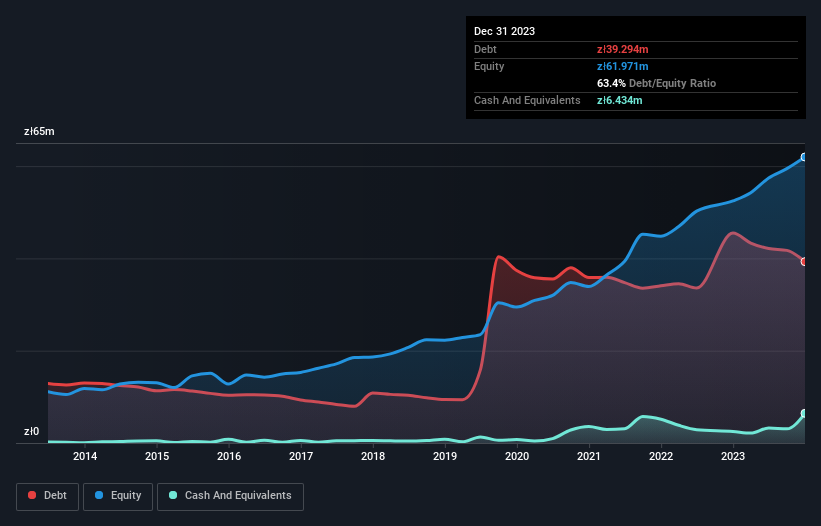Howard Marks put it nicely when he said that, rather than worrying about share price volatility, 'The possibility of permanent loss is the risk I worry about... and every practical investor I know worries about.' When we think about how risky a company is, we always like to look at its use of debt, since debt overload can lead to ruin. Importantly, Grupa RECYKL S.A. (WSE:GRC) does carry debt. But should shareholders be worried about its use of debt?
When Is Debt Dangerous?
Debt assists a business until the business has trouble paying it off, either with new capital or with free cash flow. Part and parcel of capitalism is the process of 'creative destruction' where failed businesses are mercilessly liquidated by their bankers. However, a more common (but still painful) scenario is that it has to raise new equity capital at a low price, thus permanently diluting shareholders. Of course, plenty of companies use debt to fund growth, without any negative consequences. The first step when considering a company's debt levels is to consider its cash and debt together.
Check out our latest analysis for Grupa RECYKL
What Is Grupa RECYKL's Debt?
The image below, which you can click on for greater detail, shows that Grupa RECYKL had debt of zł39.3m at the end of December 2023, a reduction from zł45.5m over a year. However, it also had zł6.43m in cash, and so its net debt is zł32.9m.

How Strong Is Grupa RECYKL's Balance Sheet?
Zooming in on the latest balance sheet data, we can see that Grupa RECYKL had liabilities of zł57.3m due within 12 months and liabilities of zł73.0m due beyond that. On the other hand, it had cash of zł6.43m and zł29.9m worth of receivables due within a year. So it has liabilities totalling zł93.9m more than its cash and near-term receivables, combined.
This is a mountain of leverage relative to its market capitalization of zł140.4m. This suggests shareholders would be heavily diluted if the company needed to shore up its balance sheet in a hurry.
In order to size up a company's debt relative to its earnings, we calculate its net debt divided by its earnings before interest, tax, depreciation, and amortization (EBITDA) and its earnings before interest and tax (EBIT) divided by its interest expense (its interest cover). This way, we consider both the absolute quantum of the debt, as well as the interest rates paid on it.
While Grupa RECYKL's low debt to EBITDA ratio of 1.1 suggests only modest use of debt, the fact that EBIT only covered the interest expense by 3.7 times last year does give us pause. But the interest payments are certainly sufficient to have us thinking about how affordable its debt is. If Grupa RECYKL can keep growing EBIT at last year's rate of 11% over the last year, then it will find its debt load easier to manage. When analysing debt levels, the balance sheet is the obvious place to start. But it is Grupa RECYKL's earnings that will influence how the balance sheet holds up in the future. So if you're keen to discover more about its earnings, it might be worth checking out this graph of its long term earnings trend.
Finally, while the tax-man may adore accounting profits, lenders only accept cold hard cash. So we always check how much of that EBIT is translated into free cash flow. Looking at the most recent three years, Grupa RECYKL recorded free cash flow of 31% of its EBIT, which is weaker than we'd expect. That's not great, when it comes to paying down debt.
Our View
While Grupa RECYKL's interest cover does give us pause, its net debt to EBITDA and EBIT growth rate suggest it can stay on top of its debt load. Looking at all the angles mentioned above, it does seem to us that Grupa RECYKL is a somewhat risky investment as a result of its debt. That's not necessarily a bad thing, since leverage can boost returns on equity, but it is something to be aware of. There's no doubt that we learn most about debt from the balance sheet. But ultimately, every company can contain risks that exist outside of the balance sheet. To that end, you should be aware of the 3 warning signs we've spotted with Grupa RECYKL .
When all is said and done, sometimes its easier to focus on companies that don't even need debt. Readers can access a list of growth stocks with zero net debt 100% free, right now.
New: Manage All Your Stock Portfolios in One Place
We've created the ultimate portfolio companion for stock investors, and it's free.
• Connect an unlimited number of Portfolios and see your total in one currency
• Be alerted to new Warning Signs or Risks via email or mobile
• Track the Fair Value of your stocks
Have feedback on this article? Concerned about the content? Get in touch with us directly. Alternatively, email editorial-team (at) simplywallst.com.
This article by Simply Wall St is general in nature. We provide commentary based on historical data and analyst forecasts only using an unbiased methodology and our articles are not intended to be financial advice. It does not constitute a recommendation to buy or sell any stock, and does not take account of your objectives, or your financial situation. We aim to bring you long-term focused analysis driven by fundamental data. Note that our analysis may not factor in the latest price-sensitive company announcements or qualitative material. Simply Wall St has no position in any stocks mentioned.
About WSE:GRC
Grupa RECYKL
Engages in the collection and management of packaging and post-consumer waste in Poland and internationally.
Mediocre balance sheet with low risk.
Market Insights
Community Narratives



